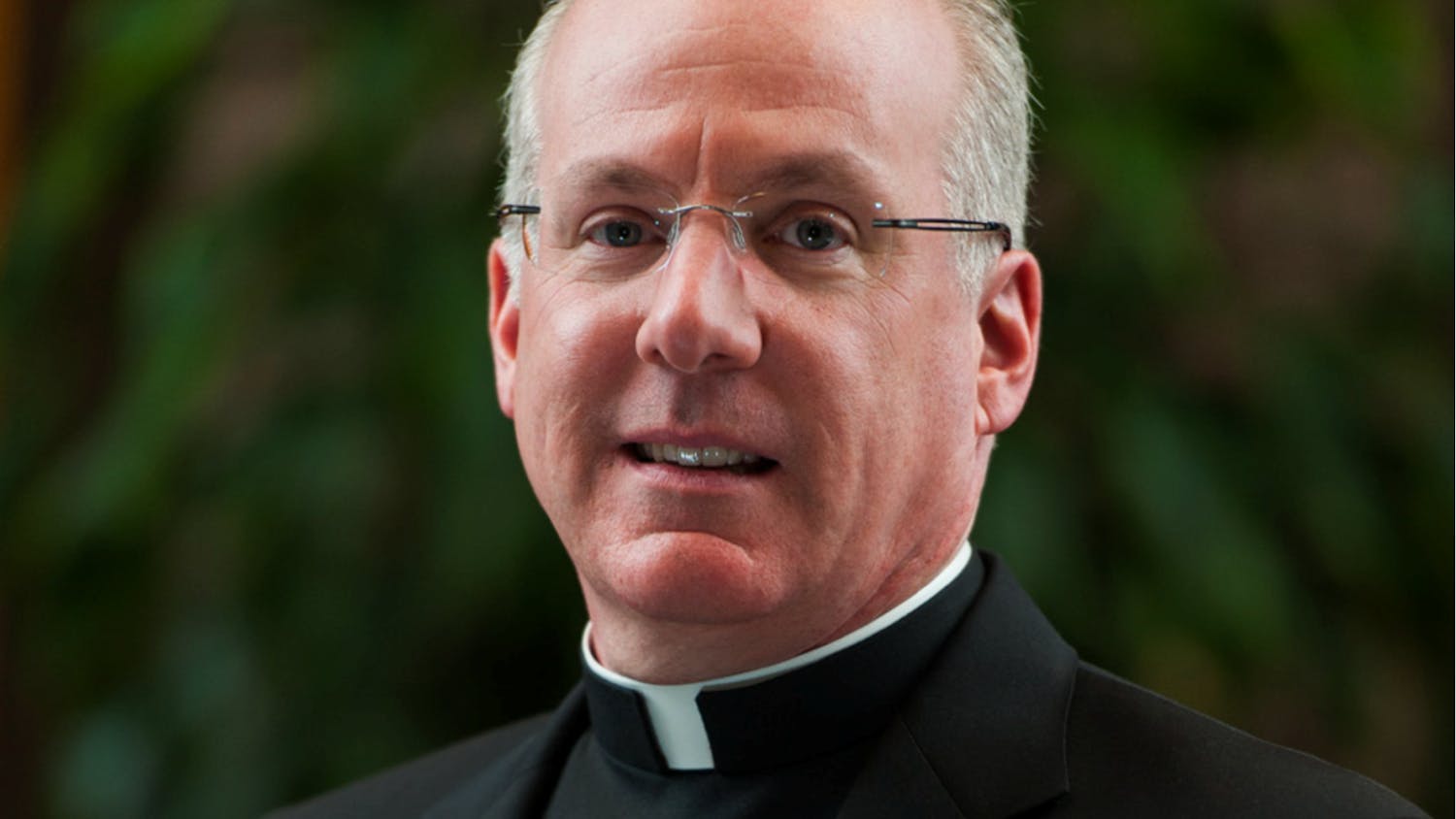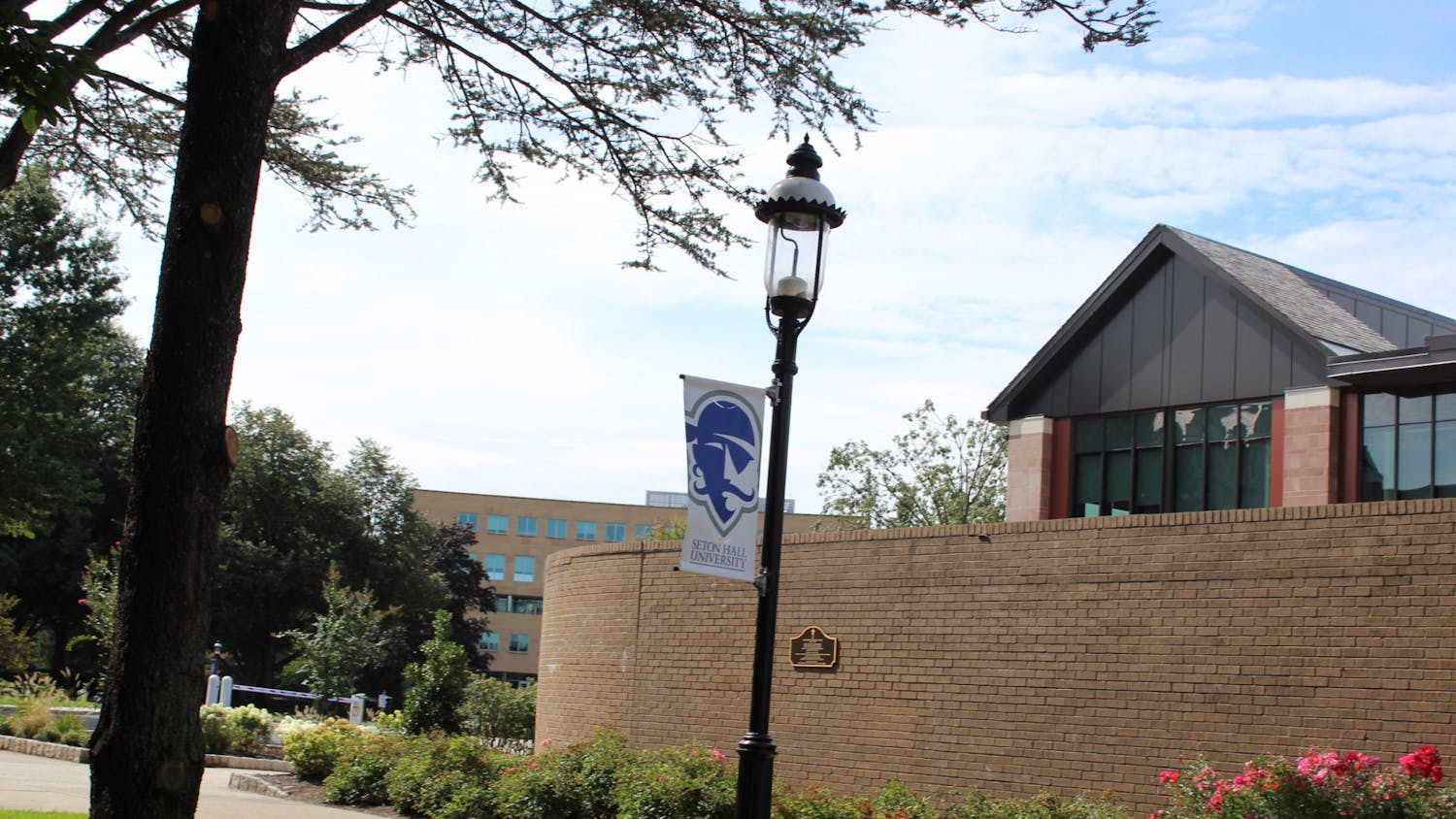Seton Hall University is – once again – facing outcries from faculty who believe the level of consideration regarding faculty input on administrative decisions has been insufficient.
The University has been dealing with an official grievance from a College of Communication and the Arts faculty member, Dr. Msgr. Dennis Mahon, who argued forcibly that the exclusion of faculty opinion regarding the review and eventual suspension of the Masters of Arts in Strategic Communication and Leadership (MASCL) program was against University policy. A Faculty Senate grievance committee agreed with him.
[caption id="attachment_18966" align="aligncenter" width="838"] Interim President Dr. Mary Meehan will conduct an investigation into the concerns about tenure decisions. Sarah Yenesel/Staff Photographer.[/caption]
Now, the University faces a resolution created by the faculty of the College of Arts & Sciences, which claims that the Office of the Provost’s decisions regarding rank and tenure for certain faculty members contravened the University’s standards for promotion and tenure. The resolution also states that Interim Provost Dr. Karen Boroff ignored or overturned rank and tenure committee decisions and that there was a lack of transparency when she did so, threatening the faculty’s confidence in Seton Hall’s shared governance policy.
Three professors were denied tenure in the past year. Dr. Raymond Capra, professor of Classical studies, was denied tenure in 2016 and now has to leave the University at the end of this semester.
This year, Dr. Martha Easton, professor of Art History, and Dr. Matthew Corrigan, associate professor and director of the Master of Social Work Program, were also denied tenure.
Per University policy, Easton and Corrigan have to leave Seton Hall in a year because their applications for tenure were rejected.
Dr. King Mott, associate professor of political science and current Chair Pro-Tem of the College of Arts & Sciences, said that a rejection for tenure is more serious than just losing a job.
“Not only do they lose their job, but they are marked,” Mott said. “It’s very hard to find another job after you have gone through the entire tenure process and have been denied. Very hard. In fact, virtually impossible. So you basically have ruined academic careers.”
The concern among College of Arts & Sciences faculty lies within the issue of shared governance, according to Dr. Roseanne Mirabella, professor of political science and public affairs and chair of the Seton Hall Advocacy chapter of the American Association of University Professors (AAUP).
According to Mirabella and Mott, faculty at a private institution like Seton Hall have a managerial status, which gives them the ability to insert their opinion regarding the hiring or removal of other faculty at the University. This managerial status gives faculty the ability to vote in terms of tenure and promotion, as well.
“Because of that we have committees at every level that look at and review the credentials of faculty if they go for tenure,” Mirabella said. “So it’s a very, very important responsibility that we have as managers.”
When a candidate’s application for tenure is submitted, it has to be approved by three separate committees before going to the provost, according to Mott.
“What has happened is candidates have gone through this process – it’s not just a year process, it’s a six year process – and have then gone through the department, the college committee and a university committee across all colleges to review their credentials. And in two instances candidates have received support, in one of them it was unanimous.”
Due to the managerial status that the faculty possesses, the University has a shared governance policy that requires administration to consider faculty votes and opinions. The managerial status and shared governance policy also forbids faculty from unionizing under the United States Supreme Court 1980 Yeshiva University ruling.
The College of Arts & Sciences faculty feel that the shared governance policy has been slighted due to the rejection of Easton’s and Corrigan’s applications for tenure.
“The provost’s decision on tenure and promotion for these individuals was counter to what all of the committees and the dean had recommended,” Mirabella said. “The tenure committee decisions were either ignored or overturned and we don’t know why this happened. There’s no reason given and it threatens our confidence in shared governance. So this is a really important issue for us.”
Dr. Kelly Goedert, director of the department of psychology’s graduate studies and incoming Chair Pro-Tem, said that “administrative decisions regarding tenure and promotion are form letters that indicate only whether a person has met or not met the standards laid out in the faculty guide.”
“There is a lack of transparency in how a person came to that decision that looks so different from all of the other decisions going up through the whole process,” Goedert said.
She also stated that shared faculty governance is one of the standards that the Seton Hall’s accrediting body, the Middle States Commission on Higher Education, uses to evaluate SHU and other universities when determining accreditation.
Due to this, the College of Arts & Sciences presented its resolution before Dr. Mary Meehan, interim president of the University. Mott and Goedert met with Meehan on April 26.
Also in attendance was Dr. Juergen Heinrichs, former Chair Pro-Tem of the College of Communication and the Arts (COAR). The COAR faculty informally voted to support the College of Arts & Sciences resolution. Twenty voted in favor, one voted against and one abstained.
“From their point of view, COAR faculty is concerned about a lack of shared governance in recent administrative processes,” Heinrichs said in an email.
Mott said that if faculty “are given managerial responsibilities, then that is the relationship that is optimal for our circumstances” and that they will not “sit quietly while academic prerogatives are violated.”
Meehan said via email after meeting Mott, Goedert and Heinrichs that she “agreed to conduct a thorough investigation into their concerns and told them that I would do this as soon as possible.”
Dr. Peter Shoemaker, dean of the College of Arts & Sciences, declined to comment. He stated that as an administrator, he is not involved with the resolution because it was an act of the faculty.
Boroff said that there is very little she can say on specific tenure cases because they are personnel matters, but provided a statement on the resolution situation via email.
“As you probably can anticipate, it is not uncommon that faculty members’ recommendations on a portfolio differ among themselves, chairs and deans may not agree, college committee members may not evaluate a portfolio the same way, and the variances continue,” Boroff said.
“Long ago, I have learned that reasonable people, given the same set of facts, may put forth different interpretations of those facts, or set out different courses of actions driven by those facts, or reach different conclusions. That is usual in any organization and occurs in most every walk of life.”
Mott said that the Arts and Sciences faculty are not trying to be antagonistic, but instead cooperative.
“We want the university to be successful. The faculty is here much longer than the administration. They’re, you know, here five, 10 years? We’re here 20, 30, 40 years,” Mott said. “So while they go to their next appointment, we are left with what they do. It’s a very serious moment. It’s troubling when our governance isn’t taken seriously.”
Ashley Turner can be reached at ashley.turner1@student.shu.edu.
Interim President Dr. Mary Meehan will conduct an investigation into the concerns about tenure decisions. Sarah Yenesel/Staff Photographer.[/caption]
Now, the University faces a resolution created by the faculty of the College of Arts & Sciences, which claims that the Office of the Provost’s decisions regarding rank and tenure for certain faculty members contravened the University’s standards for promotion and tenure. The resolution also states that Interim Provost Dr. Karen Boroff ignored or overturned rank and tenure committee decisions and that there was a lack of transparency when she did so, threatening the faculty’s confidence in Seton Hall’s shared governance policy.
Three professors were denied tenure in the past year. Dr. Raymond Capra, professor of Classical studies, was denied tenure in 2016 and now has to leave the University at the end of this semester.
This year, Dr. Martha Easton, professor of Art History, and Dr. Matthew Corrigan, associate professor and director of the Master of Social Work Program, were also denied tenure.
Per University policy, Easton and Corrigan have to leave Seton Hall in a year because their applications for tenure were rejected.
Dr. King Mott, associate professor of political science and current Chair Pro-Tem of the College of Arts & Sciences, said that a rejection for tenure is more serious than just losing a job.
“Not only do they lose their job, but they are marked,” Mott said. “It’s very hard to find another job after you have gone through the entire tenure process and have been denied. Very hard. In fact, virtually impossible. So you basically have ruined academic careers.”
The concern among College of Arts & Sciences faculty lies within the issue of shared governance, according to Dr. Roseanne Mirabella, professor of political science and public affairs and chair of the Seton Hall Advocacy chapter of the American Association of University Professors (AAUP).
According to Mirabella and Mott, faculty at a private institution like Seton Hall have a managerial status, which gives them the ability to insert their opinion regarding the hiring or removal of other faculty at the University. This managerial status gives faculty the ability to vote in terms of tenure and promotion, as well.
“Because of that we have committees at every level that look at and review the credentials of faculty if they go for tenure,” Mirabella said. “So it’s a very, very important responsibility that we have as managers.”
When a candidate’s application for tenure is submitted, it has to be approved by three separate committees before going to the provost, according to Mott.
“What has happened is candidates have gone through this process – it’s not just a year process, it’s a six year process – and have then gone through the department, the college committee and a university committee across all colleges to review their credentials. And in two instances candidates have received support, in one of them it was unanimous.”
Due to the managerial status that the faculty possesses, the University has a shared governance policy that requires administration to consider faculty votes and opinions. The managerial status and shared governance policy also forbids faculty from unionizing under the United States Supreme Court 1980 Yeshiva University ruling.
The College of Arts & Sciences faculty feel that the shared governance policy has been slighted due to the rejection of Easton’s and Corrigan’s applications for tenure.
“The provost’s decision on tenure and promotion for these individuals was counter to what all of the committees and the dean had recommended,” Mirabella said. “The tenure committee decisions were either ignored or overturned and we don’t know why this happened. There’s no reason given and it threatens our confidence in shared governance. So this is a really important issue for us.”
Dr. Kelly Goedert, director of the department of psychology’s graduate studies and incoming Chair Pro-Tem, said that “administrative decisions regarding tenure and promotion are form letters that indicate only whether a person has met or not met the standards laid out in the faculty guide.”
“There is a lack of transparency in how a person came to that decision that looks so different from all of the other decisions going up through the whole process,” Goedert said.
She also stated that shared faculty governance is one of the standards that the Seton Hall’s accrediting body, the Middle States Commission on Higher Education, uses to evaluate SHU and other universities when determining accreditation.
Due to this, the College of Arts & Sciences presented its resolution before Dr. Mary Meehan, interim president of the University. Mott and Goedert met with Meehan on April 26.
Also in attendance was Dr. Juergen Heinrichs, former Chair Pro-Tem of the College of Communication and the Arts (COAR). The COAR faculty informally voted to support the College of Arts & Sciences resolution. Twenty voted in favor, one voted against and one abstained.
“From their point of view, COAR faculty is concerned about a lack of shared governance in recent administrative processes,” Heinrichs said in an email.
Mott said that if faculty “are given managerial responsibilities, then that is the relationship that is optimal for our circumstances” and that they will not “sit quietly while academic prerogatives are violated.”
Meehan said via email after meeting Mott, Goedert and Heinrichs that she “agreed to conduct a thorough investigation into their concerns and told them that I would do this as soon as possible.”
Dr. Peter Shoemaker, dean of the College of Arts & Sciences, declined to comment. He stated that as an administrator, he is not involved with the resolution because it was an act of the faculty.
Boroff said that there is very little she can say on specific tenure cases because they are personnel matters, but provided a statement on the resolution situation via email.
“As you probably can anticipate, it is not uncommon that faculty members’ recommendations on a portfolio differ among themselves, chairs and deans may not agree, college committee members may not evaluate a portfolio the same way, and the variances continue,” Boroff said.
“Long ago, I have learned that reasonable people, given the same set of facts, may put forth different interpretations of those facts, or set out different courses of actions driven by those facts, or reach different conclusions. That is usual in any organization and occurs in most every walk of life.”
Mott said that the Arts and Sciences faculty are not trying to be antagonistic, but instead cooperative.
“We want the university to be successful. The faculty is here much longer than the administration. They’re, you know, here five, 10 years? We’re here 20, 30, 40 years,” Mott said. “So while they go to their next appointment, we are left with what they do. It’s a very serious moment. It’s troubling when our governance isn’t taken seriously.”
Ashley Turner can be reached at ashley.turner1@student.shu.edu.





